Family Memorial Ceremony | “It’s Been 85 Years. I Hope My Children Could Remember the History”
On November 25, ahead of the ninth national memorial day for the victims of the Nanjing Massacre, the 2022 family memorial ceremony for the victims of the Nanjing Massacre was held in front of the Wall of Tears. In the company of their family, survivors Ai Yiying, Ma Tingbao and Ruan Dingdong offered floral tribute. Pointing at the name of their lost loved ones with their trembling hand full of wrinkles, they shared their pain over the past 85 years.
During the ceremony, staff members of the Memorial Hall and Yu Huiming, a representative of the family members of the victims in the Nanjing Massacre, straightened the flower basket and elegiac couplet together. All the people present held a chrysanthemum in their hand and made three bows to those who lost their lives during the Nanjing Massacre.
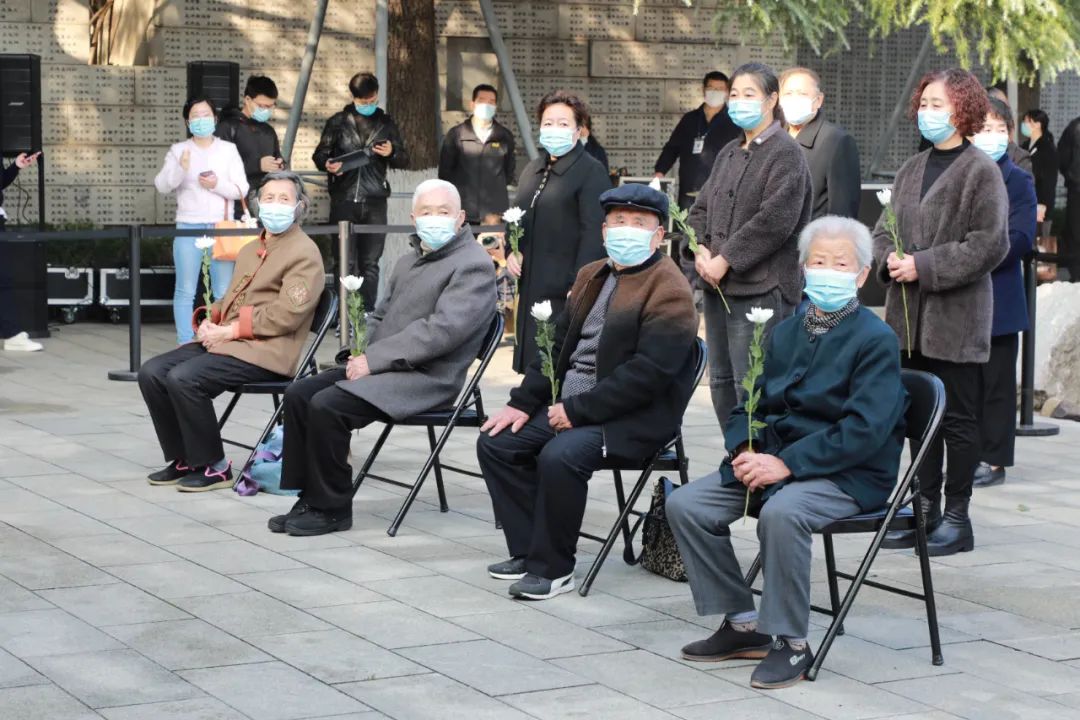
After the activity, Ai, Ma, and Ruan found the names of their lost loved ones on the Wall of Tears and offered flowers to express their grief. Ruan comes to the Memorial Hall every year to offer sacrifice to his grandfather who was killed by Japanese soldiers to protect him. “Although the number of survivors alive is decreasing, our efforts to inherit and spread historical truth will never stop,” he said.
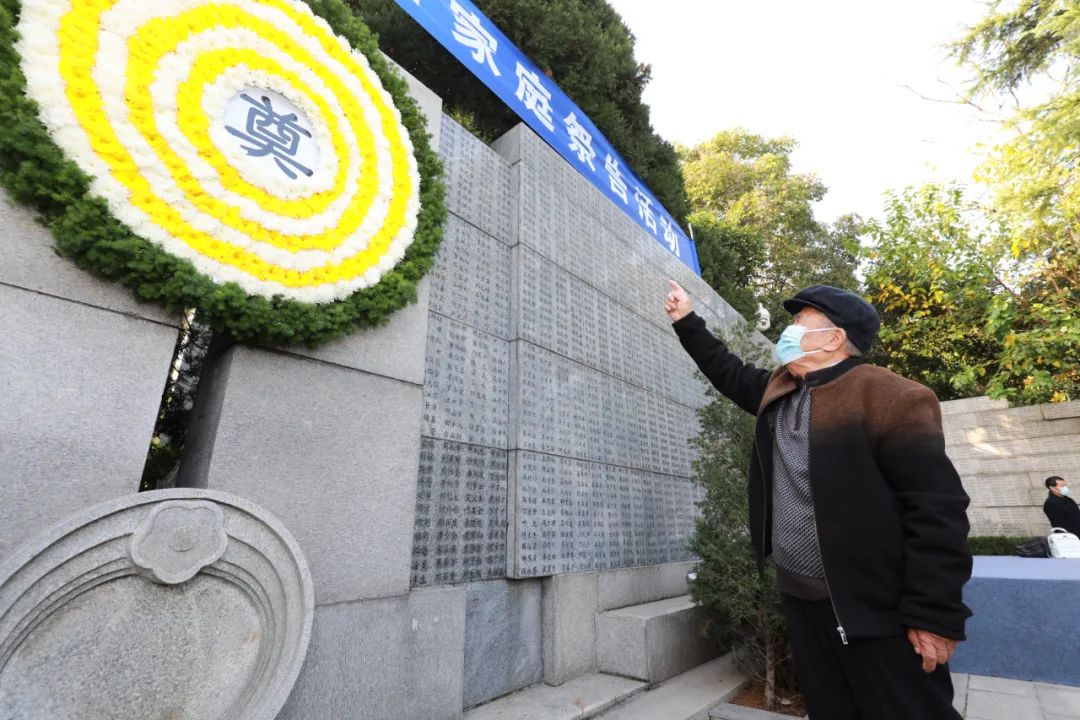
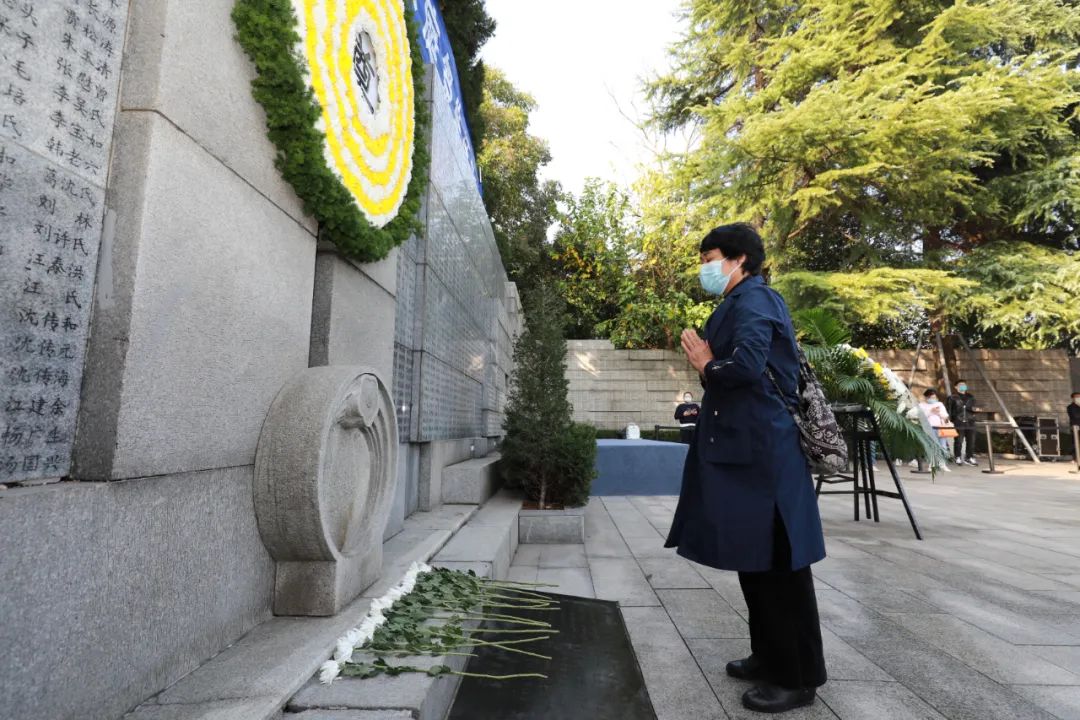
Pain ·Not Forgetting
These survivors who were young 85 years back are now gray-headed. Recalling their past again and again, they can’t help but shed tears of pain, but still insist on telling their stories again and again.
Survivor Ai Yiying: Six Family Members Killed by Japanese Soldiers, Leaving Widows
During the Nanjing Massacre, seven family members of Ai were taken away by Japanese soldiers, including her father Ai Renyin, her two uncles Ai Renbing and Ai Renlin, and her two cousins Ai Yisheng and Ai Yirong. In the end, only her cousin Ai Yirong was saved, and the other six were all killed by the Japanese soldiers. The women in her family had to live a hard life with the children, called “widows in Ai’s family” by others. She was heart-broken whenever she heard that.
Today, 94-year-old Ai is already gray-headed, but is still in good health and able to talk clearly. Wearing a floral silk scarf, she looks vigorous. “I’m very satisfied with my life now. It’s so much better than life in the past. Great changes have taken place in China. We can see high buildings and big roads everywhere. I have four sons and they all have a car. I can get retirement money on the 15th day of each month,” she said with tears in her eyes while recalling the unfortunate experiences of her family during the Nanjing Massacre 85 years ago. Ai hopes that the Japanese government could admit that they committed the Nanjing Massacre, and apologize for it. For her descendants, she asked them to “remember the history and build China into a more powerful country.”
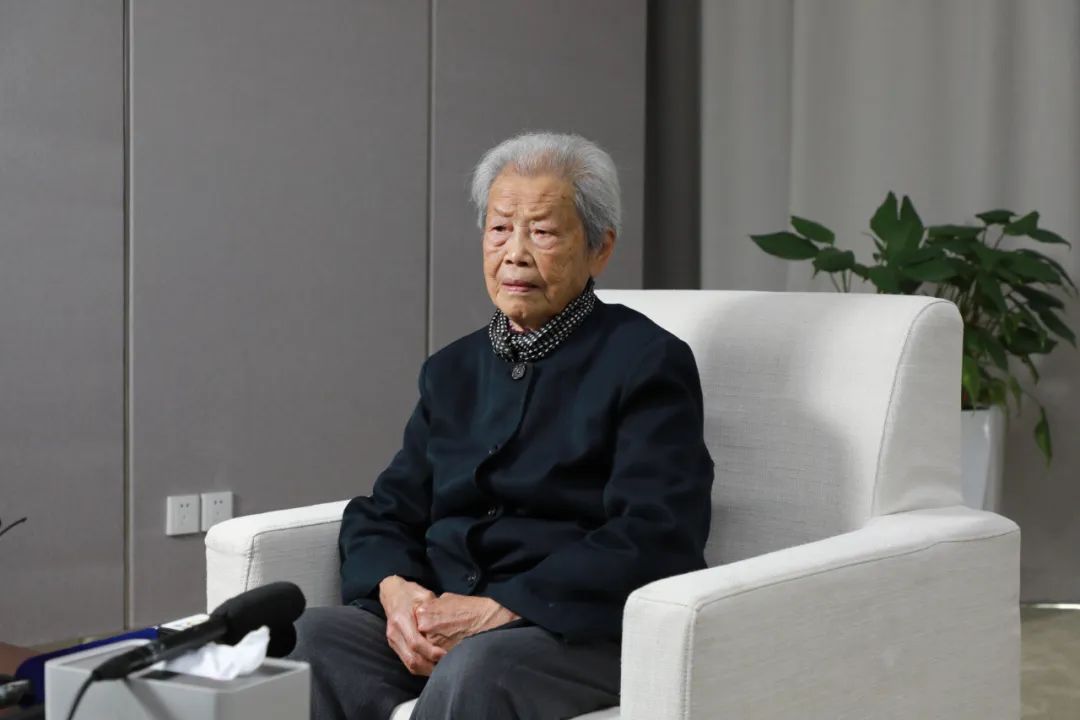
Survivor Ma Tingbao: “My Father and Uncles Were All Slaughtered”
Although 85 years have passed, Ma still feels a lot of pain when he relives the past. “My father Ma Yuquan, my uncle-in-law Yang Shoulin, my mother’s brother Wen Zhixue, and some uncles were captured by Japanese soldiers along with many young men. They were all slaughtered near the river at Xiaguan. I survived because of my young age.”
Today, Ma attended the family memorial ceremony at the Memorial Hall in the company of his two daughters Ma Minghong and Ma Minglan, and received the interview as a survivor of the Nanjing Massacre. Ma also has a son. “My children have built their families and even have their grandchildren now. They are all good children, taking me to travel to places like Chongqing, Xiamen, Dalian, and Beijing.” He said he wishes his descendants would remember the Nanjing Massacre and cherish hard-won peace. His second daughter Ma Minglan said as her father grows old, she, as a descendant, will take the baton to continue to tell the historical memory to others.
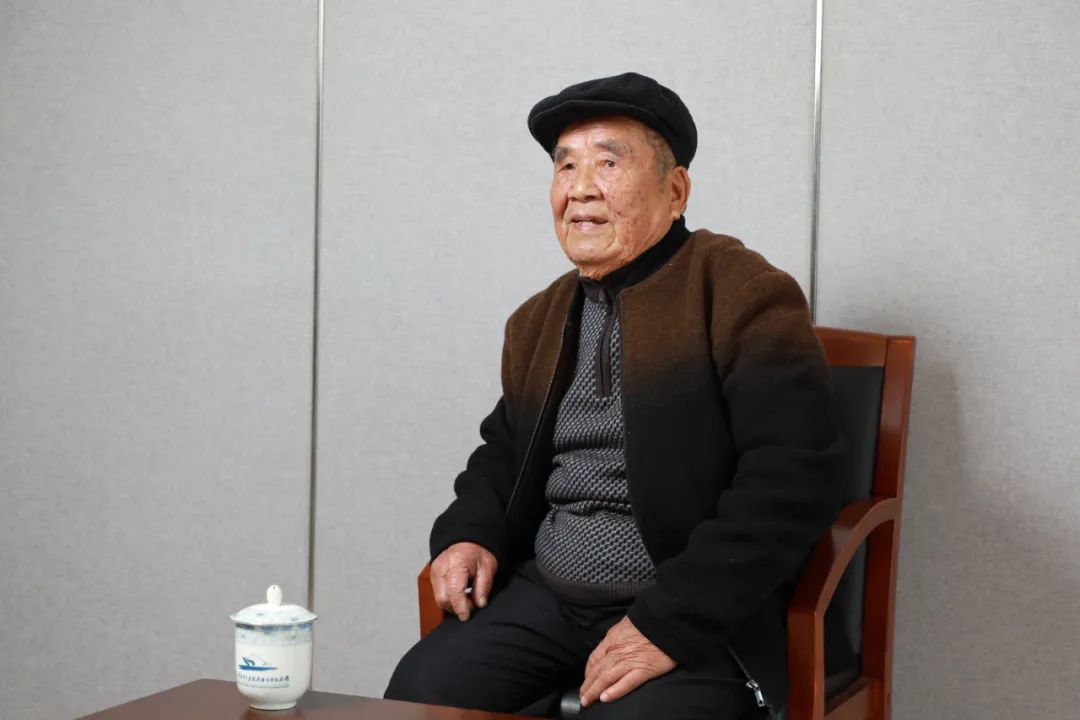
Survivor Ruan Dingdong: “My Grandfather Gave His Life to Protect Me”
Ruan told the Memorial Hall that he was still a baby when the Nanjing Massacre took place in 1937. To protect him, his grandfather was fatally stabbed by some Japanese soldiers and unfortunately died. His parents often talked about the story with him when he was young, and he has been keeping it in his mind. He remembered his grandson Ruan Jie once wrote a composition titled My Grandfather in primary school, and said that reminded him of his grandfather. He will never forget the pain of losing his grandfather, so he must come to the Memorial Hall and tell others how his grandfather was killed.
“My grandfather’s name, Ruan Jiatian, was inscribed on the Wall of Tears before the Tomb-Sweeping Day in 2013. That year, 22 people from four generations of my family took part in the family memorial ceremony and offered flowers to my grandfather. We wanted him to know that our country has become powerful now. The Japanese government hasn’t admitted they committed the Nanjing Massacre. I must tell the history to my descendants.” When Ruan Jie graduated from university, he followed his grandfather’s wishes and recounted the story of his family to visitors at the Memorial Hall as a volunteer.
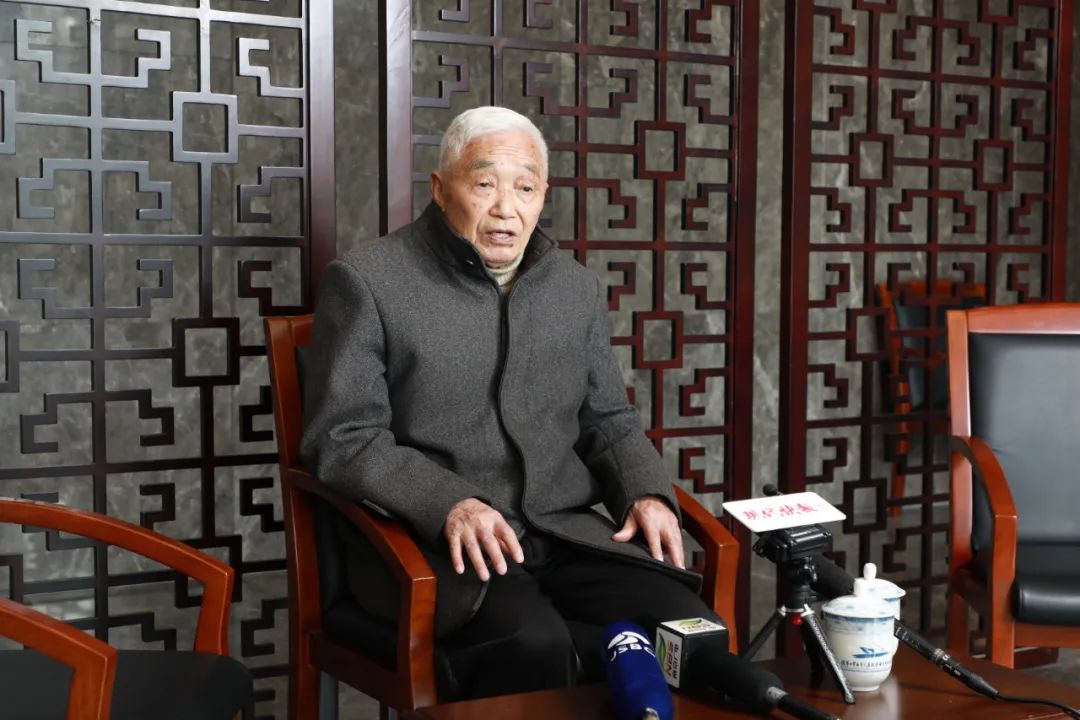
Memory ·Passing on
Some descendants of the survivors of the Nanjing Massacre also came to the Memorial Hall to tell visitors the story of inheriting family memory. Among them were Xia Tianxing, Chang Xiaomei, and Li Zhenming.
Xia Tianxing: Teaching Himself English and Studying English Materials about the Nanjing Massacre
Wang Suming, a survivor of the Nanjing Massacre, passed away on March 23, 2022. Her son-in-law Xia became one of China’s first group of “inheritors of historical memories of the Nanjing Massacre”. He came to the Memorial Hall to relate the experiences of his mother-in-law. During the Nanjing Massacre, Wang’s father was killed by Japanese soldiers to protect the teachers and students of a school where he was the principal. “My mother-in-law often reminded us not to forget the monstrous crimes the Japanese invaders committed.”
To let more foreign people learn about the Nanjing Massacre, Xia taught himself English and bought English materials regarding the massacre. During the interview as part of today’s activity, he talked about the history of the Nanjing Massacre in fluent English in front of the camera. “I noticed that foreigners barely heard of the Nanjing Massacre, and they only know World War II. Every time I told them about the Nanjing Massacre, they were really shocked,” Xia said. “My mother-in-law has left us, but the history of the Nanjing Massacre will be passed on from generation to generation. My daughter is now living abroad. In the future, we will go abroad and tell our foreign friends about this history as family members of a Nanjing Massacre survivor, so that more people could understand the truth behind the Nanjing Massacre.”
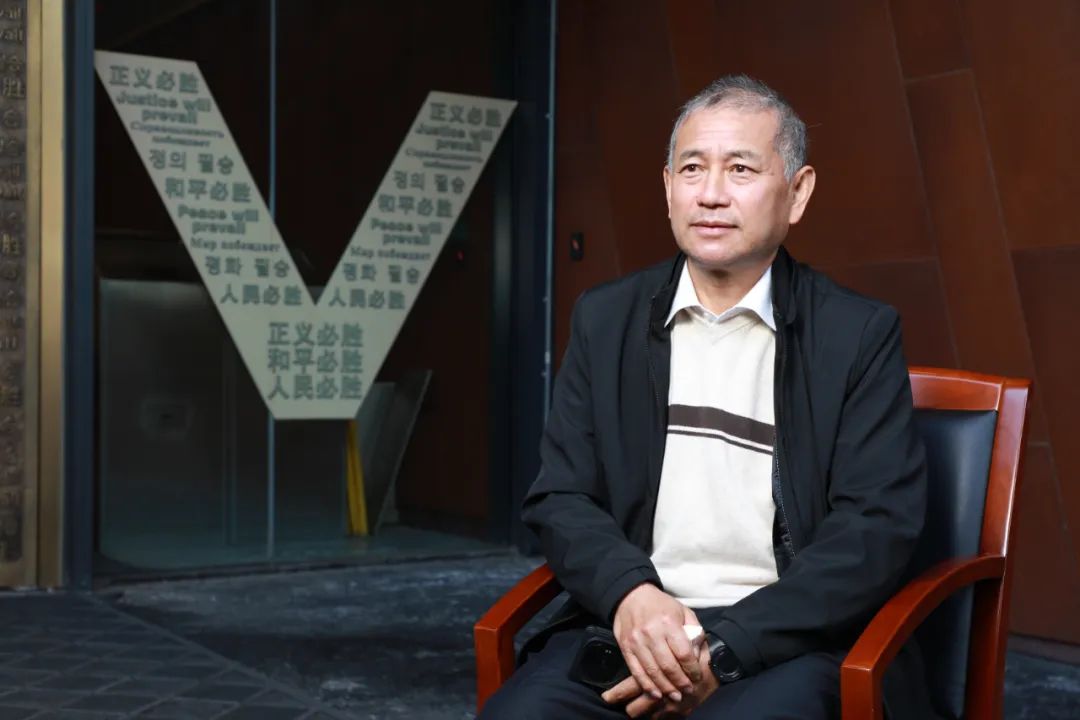
Chang Xiaomei: Writing a Book about Her Father’s Experiences, Hoping He Could Live Happily for the Rest of His Life
As Chang Zhiqiang, also a survivor of the Nanjing Massacre, couldn’t show up today, his daughter came to the Memorial Hall to share the story of her family on behalf of her father and her family. “The Nanjing Massacre made my father an orphan at the age of nine, a painful memory that stays with him for the rest of his life. When we were young, we didn’t dare to mention it in front of him because whenever he thought about that experience, he would be in no mood to eat anything for days and be sullen all day long.” One day in 1997, when Chang learned that Japanese right-wing forces publicly denied the Nanjing Massacre took place, he couldn’t sleep that night. He described his personal experiences in a written material and sent it to the Memorial Hall. “From then on, he opened his heart and became active in various activities to recount the history. He showed up for shooting videos, took part in activities at the Memorial Hall, and even went to Japan for a testimony assembly of survivors of the Nanjing Massacre.”
Now Chang is 94 years old. In 2022, Chang Xiaomei became one of the first group of China’s “inheritors of historical memories of the Nanjing Massacre”. Over these years, she often accompanied her father in various testimony activities, and she wrote a book, Life of Chang Zhiqiang, a Survivor of the Nanjing Massacre, to record and describe her father’s ordinary yet unusual life. “He had a miserable childhood, and now I hope he could spend his remaining years in happiness.” She said now as her father grows old, she will continue to keep the historical memory of her family.
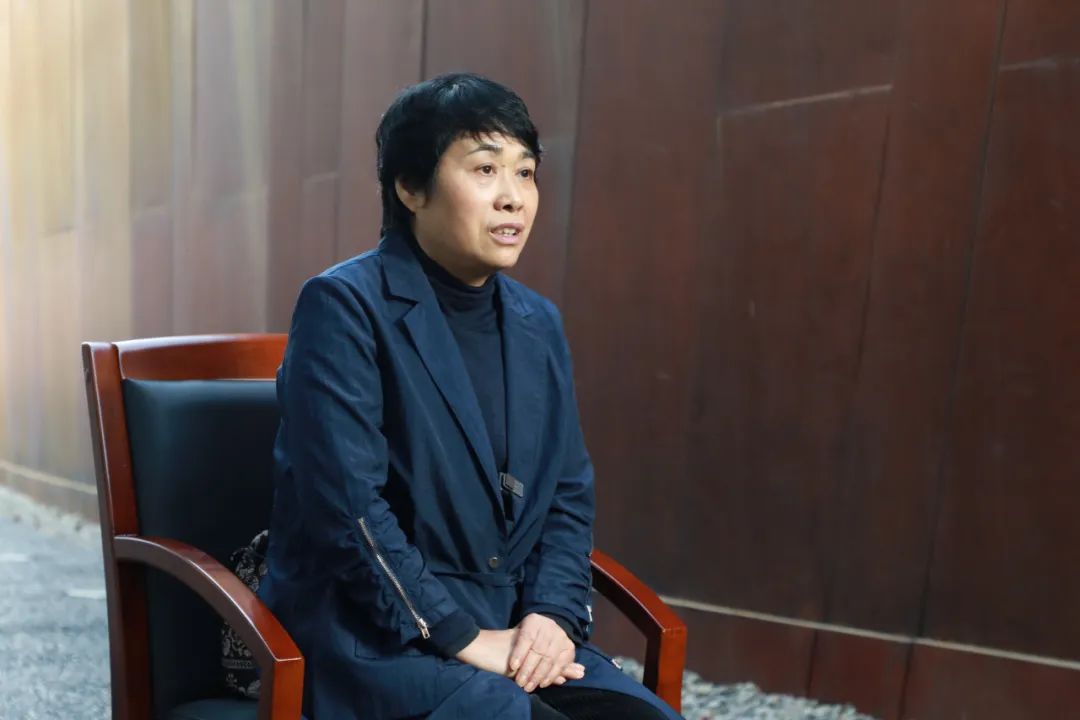
Li Zhenming: Working as a Guide Volunteer, Encouraging Young Generation to Work Hard
Li is the son of Li Gaoshan, a Nanjing Massacre survivor who has passed away. He also did an interview as one of the first group of China’s “inheritors of historical memories of the Nanjing Massacre”. After his father passed way, Li has taken the baton of history narrator and volunteers to work as an oral guide at the Memorial Hall to tell visitors about his father’s experiences while reminding them to remember history and calling for peace.
This month, Li will recount his family history to a group of kindergarten teachers. “This is very meaningful. I tell it to 10 people, and maybe they will tell it to 100 people.” Li said he feels that the burden on his shoulders is getting heavier as the number of survivors drops. “The descendants of the survivors know best what they experienced. I’m also getting old now. I don’t know how much time is left for me, but I will absolutely tell as much as possible now, not to stir up hatred, but to encourage the young generation to go all out to make the country strong.”
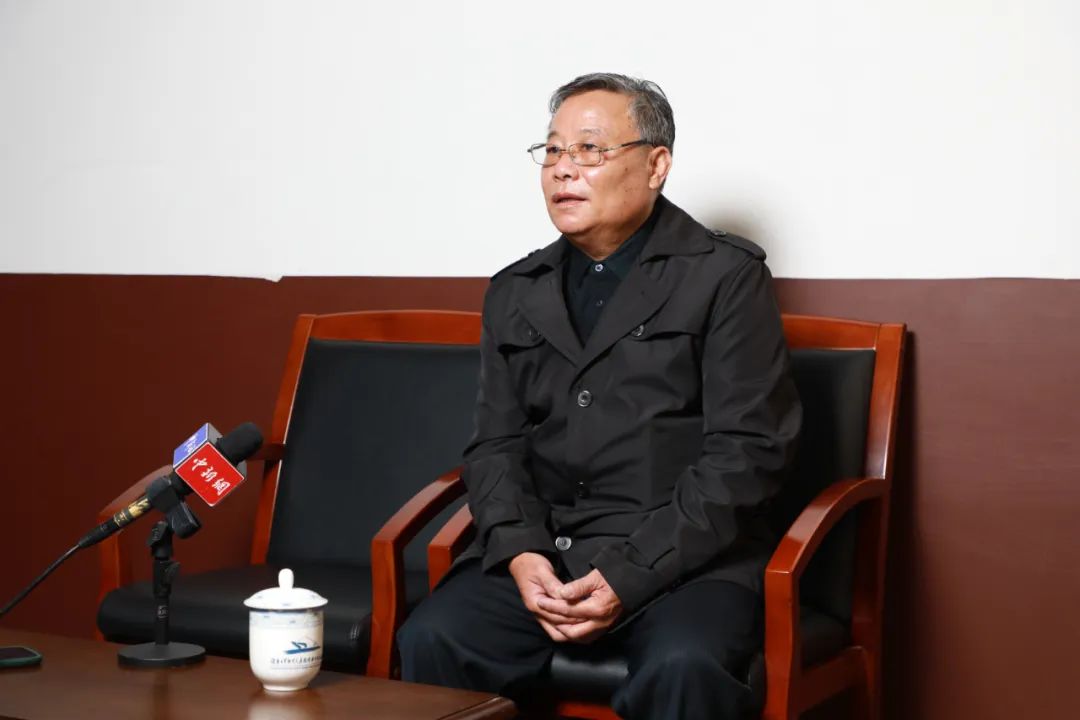
So far, China’s number of registered survivors of the Nanjing Massacre has been reduced to 55 with an average age of 92. The memory of the tragedy that occurred 85 years ago caused great pain to the city and the whole nation. Now the memory is being passed into the hands of “inheritors of historical memories of the Nanjing Massacre”. They will take the baton of “remembering history and cherishing peace”, and pass on the history from generation to generation.

